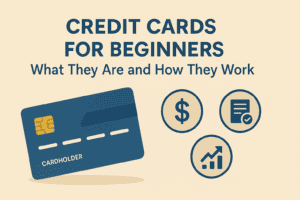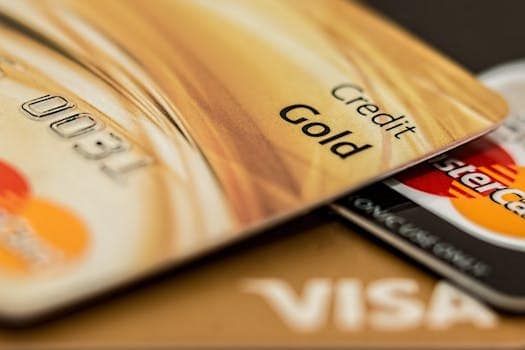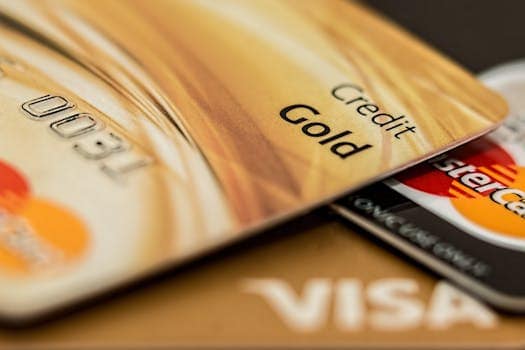-
Table of Contents
Introduction to Credit Cards
Credit cards are a common financial tool that many people use in their daily lives. For beginners, understanding how credit cards work and the benefits they offer can be overwhelming. In this article, we will provide an introduction to credit cards, explaining what they are and how they work.
 A credit card is a plastic card issued by a financial institution that allows the cardholder to borrow money to make purchases. When you use a credit card, you are essentially borrowing money from the card issuer, with the promise to pay it back at a later date. The amount you can borrow is determined by your credit limit, which is set by the card issuer based on your credit history and income.
A credit card is a plastic card issued by a financial institution that allows the cardholder to borrow money to make purchases. When you use a credit card, you are essentially borrowing money from the card issuer, with the promise to pay it back at a later date. The amount you can borrow is determined by your credit limit, which is set by the card issuer based on your credit history and income.
One of the key benefits of using a credit card is the ability to make purchases without having to pay for them immediately. This can be especially helpful in emergencies or when you need to make a large purchase. However, it is important to remember that using a credit card is not free money – you will need to pay back the amount you borrow, plus any interest that accrues.
When you make a purchase with a credit card, the card issuer pays the merchant on your behalf. You then have a certain period of time, known as the grace period, to pay back the amount you borrowed. If you pay off the full balance by the due date, you will not be charged any interest. However, if you carry a balance from month to month, you will be charged interest on the remaining balance.
It is important to understand the terms and conditions of your credit card, including the interest rate, fees, and any rewards or benefits that may be offered. Different credit cards have different features, so it is important to choose one that best suits your needs and financial situation.
Using a credit card responsibly can help you build a positive credit history, which can be beneficial when applying for loans or other forms of credit in the future. Making on-time payments and keeping your credit card balances low can help improve your credit score and demonstrate to lenders that you are a responsible borrower.
In conclusion, credit cards can be a useful financial tool for beginners, providing a convenient way to make purchases and build credit. By understanding how credit cards work and using them responsibly, you can take advantage of the benefits they offer while avoiding the pitfalls of debt and high interest charges. If used wisely, credit cards can be a valuable asset in managing your finances and achieving your financial goals.
How Credit Cards Work
 Credit cards are a common financial tool that many people use in their daily lives. They offer convenience and flexibility when it comes to making purchases, but for beginners, understanding how credit cards work can be a bit overwhelming. In this article, we will break down the basics of credit cards and explain how they function.
Credit cards are a common financial tool that many people use in their daily lives. They offer convenience and flexibility when it comes to making purchases, but for beginners, understanding how credit cards work can be a bit overwhelming. In this article, we will break down the basics of credit cards and explain how they function.
At its core, a credit card is a payment card issued by a financial institution that allows the cardholder to borrow funds to make purchases. When you use a credit card, you are essentially borrowing money from the card issuer with the promise to pay it back at a later date. This borrowed amount is known as your credit limit, which is the maximum amount of money you can spend using the card.
Each month, you will receive a statement from the credit card issuer detailing your purchases, payments, and any fees or interest charges. It is important to review this statement carefully to ensure that all charges are accurate and to track your spending habits. If you fail to pay off the full balance by the due date, you will incur interest charges on the remaining balance.
Credit cards also come with a minimum payment requirement, which is the smallest amount you must pay each month to keep your account in good standing. While making the minimum payment can help you avoid late fees and penalties, it is important to pay off the full balance whenever possible to avoid accumulating debt.
One of the key features of credit cards is the ability to earn rewards or cash back on your purchases. Many credit card issuers offer rewards programs that allow cardholders to earn points, miles, or cash back on eligible purchases. These rewards can be redeemed for travel, merchandise, or statement credits, providing an added incentive for using the card.
Another important aspect of credit cards is the concept of credit utilization, which is the ratio of your credit card balance to your credit limit. Maintaining a low credit utilization ratio is important for your credit score, as high utilization can indicate that you are relying too heavily on credit and may be at risk of default.
In addition to rewards and credit utilization, credit cards also offer consumer protections that can help safeguard your purchases. Many credit cards come with purchase protection, extended warranties, and fraud protection, which can provide peace of mind when making large or online purchases.
Overall, credit cards can be a valuable financial tool for beginners when used responsibly. By understanding how credit cards work and managing your spending wisely, you can build a positive credit history, earn rewards, and enjoy the convenience and flexibility that credit cards offer. Remember to pay off your balance in full each month, monitor your statements regularly, and take advantage of any rewards or benefits that come with your card. With these tips in mind, you can make the most of your credit card and use it to your advantage.
Types of Credit Cards
 Credit cards are a common financial tool that many people use in their daily lives. They offer convenience and flexibility when it comes to making purchases, but for beginners, understanding the different types of credit cards available can be overwhelming. In this article, we will explore the various types of credit cards and how they work to help you make informed decisions about which one is right for you.
Credit cards are a common financial tool that many people use in their daily lives. They offer convenience and flexibility when it comes to making purchases, but for beginners, understanding the different types of credit cards available can be overwhelming. In this article, we will explore the various types of credit cards and how they work to help you make informed decisions about which one is right for you.
One of the most common types of credit cards is the standard credit card. These cards are issued by banks and financial institutions and allow cardholders to make purchases up to a certain credit limit. The cardholder is then required to pay back the amount borrowed, plus any interest that may accrue, by the due date each month. Standard credit cards are a good option for beginners who are looking to build their credit history and establish a positive credit score.
Another type of credit card is the rewards credit card. These cards offer cardholders the opportunity to earn rewards, such as cash back, points, or miles, for every dollar spent. Rewards credit cards can be a great option for beginners who are looking to maximize their spending and earn valuable rewards in return. However, it is important to carefully review the terms and conditions of the rewards program to ensure that it aligns with your spending habits and financial goals.
For beginners who are looking to consolidate their debt or make a large purchase, a balance transfer credit card may be a good option. Balance transfer credit cards allow cardholders to transfer existing credit card balances to a new card with a lower interest rate or promotional period. This can help cardholders save money on interest and pay off their debt more quickly. However, it is important to be mindful of any balance transfer fees and to make sure that you can pay off the transferred balance within the promotional period to avoid accruing additional interest.
If you are a frequent traveler, a travel credit card may be the right choice for you. These cards offer perks such as travel insurance, airport lounge access, and bonus points for travel-related purchases. Travel credit cards can be a great option for beginners who want to earn rewards for their travel expenses and enjoy additional benefits while on the go. However, it is important to consider any annual fees associated with the card and to make sure that the rewards and benefits align with your travel habits and preferences.
In conclusion, there are many different types of credit cards available for beginners to choose from. Whether you are looking to build your credit history, earn rewards, consolidate debt, or enjoy travel perks, there is a credit card out there that can meet your needs. It is important to carefully review the terms and conditions of each card, compare the benefits and fees, and choose a card that aligns with your financial goals and lifestyle. By understanding the different types of credit cards and how they work, you can make informed decisions about which card is right for you.
Pros and Cons of Using Credit Cards
Credit cards have become an essential part of our daily lives, offering convenience and flexibility when it comes to making purchases. However, for beginners who are new to the world of credit cards, it’s important to understand the pros and cons of using them before diving in.
One of the biggest advantages of using a credit card is the ability to build credit. By making timely payments and keeping your credit utilization low, you can establish a positive credit history, which can be beneficial when applying for loans or mortgages in the future. Additionally, many credit cards offer rewards programs that allow you to earn cash back, travel points, or other perks for every dollar you spend.
Another advantage of using credit cards is the added security they provide. Unlike cash or debit cards, credit cards offer fraud protection, meaning you won’t be held responsible for unauthorized charges made on your card. This can provide peace of mind when making purchases online or in unfamiliar places.
On the other hand, there are also some drawbacks to using credit cards that beginners should be aware of. One of the biggest disadvantages is the potential for overspending. With a credit card, it can be easy to lose track of how much you’re spending, leading to debt that can quickly spiral out of control if not managed properly.
Additionally, credit cards often come with high interest rates, especially for those with limited credit history. If you carry a balance on your card from month to month, you could end up paying a significant amount in interest fees, negating any rewards or benefits you may have earned.
Another downside to using credit cards is the temptation to make impulse purchases. With the ability to buy now and pay later, it can be tempting to splurge on items you don’t necessarily need, leading to unnecessary debt and financial stress.
Despite these drawbacks, credit cards can still be a valuable financial tool when used responsibly. By paying your balance in full each month and avoiding unnecessary purchases, you can take advantage of the benefits of credit cards without falling into debt.
In conclusion, credit cards can be a useful tool for beginners looking to build credit and earn rewards on their purchases. However, it’s important to weigh the pros and cons before applying for a card and to use it responsibly to avoid falling into debt. By understanding how credit cards work and making informed decisions about your spending habits, you can make the most of this financial tool and avoid common pitfalls.
Tips for Using Credit Cards Wisely
Credit cards can be a valuable financial tool when used wisely. They offer convenience, security, and the ability to build credit. However, for beginners, navigating the world of credit cards can be overwhelming. It’s important to understand how credit cards work and how to use them responsibly to avoid falling into debt.
One of the most important tips for using credit cards wisely is to only charge what you can afford to pay off in full each month. This means not carrying a balance from month to month and avoiding interest charges. By paying off your balance in full, you can avoid accumulating debt and damaging your credit score.
Another tip for using credit cards wisely is to always pay your bill on time. Late payments can result in fees, increased interest rates, and damage to your credit score. Setting up automatic payments or reminders can help ensure that you never miss a payment.
It’s also important to keep track of your spending and monitor your credit card statements regularly. This can help you identify any unauthorized charges and prevent fraud. By reviewing your statements, you can also track your spending habits and make adjustments as needed to stay within your budget.
When choosing a credit card, it’s important to consider the terms and conditions, including the interest rate, annual fees, and rewards programs. Look for a card with a low interest rate and no annual fees to minimize costs. If you plan to use your credit card for everyday purchases, consider a card with a rewards program that aligns with your spending habits.
It’s also important to be mindful of your credit limit and not max out your card. Using too much of your available credit can negatively impact your credit score. Aim to keep your credit utilization ratio below 30% to maintain a healthy credit score.
If you find yourself struggling to manage your credit card debt, don’t hesitate to seek help. There are resources available, such as credit counseling services, that can provide guidance on how to pay off debt and improve your financial situation.
In conclusion, credit cards can be a valuable financial tool for beginners when used responsibly. By following these tips for using credit cards wisely, you can avoid falling into debt and build a positive credit history. Remember to only charge what you can afford to pay off in full each month, pay your bill on time, monitor your spending, choose a card with favorable terms, and seek help if needed. With careful planning and discipline, you can make the most of your credit cards and achieve your financial goals.
Common Mistakes to Avoid
When it comes to managing your finances, credit cards can be a valuable tool. They offer convenience, security, and the opportunity to build your credit history. However, for beginners, credit cards can also be a source of confusion and potential pitfalls. In this article, we will discuss some common mistakes that beginners make when using credit cards and how to avoid them.
One of the most common mistakes that beginners make with credit cards is overspending. It can be tempting to use your credit card to make purchases that you wouldn’t be able to afford with cash. However, it’s important to remember that a credit card is not free money. Every purchase you make with your credit card will need to be paid back, often with interest. To avoid overspending, it’s important to create a budget and stick to it. Only use your credit card for purchases that you can afford to pay off in full each month.
Another common mistake that beginners make with credit cards is only making the minimum payment each month. While making the minimum payment can help you avoid late fees and penalties, it can also lead to a cycle of debt. When you only make the minimum payment, you are only paying off a small portion of your balance, while the rest continues to accrue interest. To avoid this mistake, try to pay off your balance in full each month. If that’s not possible, aim to pay more than the minimum payment to reduce your balance faster.
Not keeping track of your spending is another common mistake that beginners make with credit cards. It can be easy to lose track of how much you’re spending when you’re using a credit card for all of your purchases. To avoid overspending, it’s important to keep track of your spending and monitor your credit card statements regularly. This will help you stay on top of your finances and avoid any surprises when it comes time to pay your bill.
Using your credit card for cash advances is another common mistake that beginners make. While it may seem convenient to use your credit card to get cash when you’re in a pinch, cash advances often come with high fees and interest rates. It’s best to avoid using your credit card for cash advances unless it’s absolutely necessary. If you find yourself in need of cash, consider other options such as a personal loan or borrowing from a friend or family member.
Finally, not understanding the terms and conditions of your credit card is a mistake that many beginners make. It’s important to read the fine print of your credit card agreement so that you understand the fees, interest rates, and other terms associated with your card. This will help you avoid any surprises and make informed decisions about how to use your credit card responsibly.
In conclusion, credit cards can be a valuable financial tool for beginners, but they can also be a source of confusion and potential pitfalls. By avoiding these common mistakes and using your credit card responsibly, you can build a positive credit history and improve your financial well-being.
Conclusion
In conclusion, credit cards can be a valuable financial tool for beginners when used responsibly. They offer convenience, security, and the opportunity to build credit history. However, it is important for beginners to understand how credit cards work and to use them wisely to avoid falling into debt.
When choosing a credit card, beginners should consider factors such as interest rates, fees, rewards, and credit limits. It is important to compare different options and choose a card that best fits your financial needs and spending habits. Additionally, beginners should be aware of the terms and conditions of their credit card agreement, including the APR, grace period, and any fees associated with the card.
Once you have a credit card, it is important to use it responsibly. This means paying your bill on time and in full each month to avoid interest charges and late fees. It is also important to keep track of your spending and stay within your credit limit to avoid overspending. By using your credit card responsibly, you can build a positive credit history and improve your credit score over time.
If you find yourself struggling to manage your credit card debt, there are steps you can take to get back on track. This may include creating a budget, cutting back on expenses, and seeking help from a credit counselor. It is important to address any issues with credit card debt as soon as possible to avoid further financial problems.
Overall, credit cards can be a useful tool for beginners to help manage their finances and build credit. By understanding how credit cards work and using them responsibly, beginners can take advantage of the benefits that credit cards offer while avoiding the pitfalls of debt. Remember to choose a credit card that fits your financial needs, use it responsibly, and seek help if you find yourself struggling with credit card debt. With the right approach, credit cards can be a valuable tool for beginners on their financial journey.


1 thought on “Credit Cards for Beginners: What They Are and How They Work”